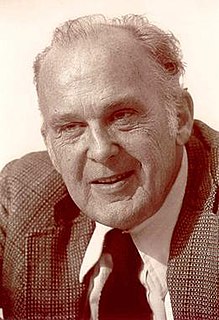Related Research Articles

In the philosophy of science, falsifiability or refutability is the capacity for a statement, theory or hypothesis to be contradicted by evidence. For example, the statement "All swans are white" is falsifiable because one can observe that black swans exist.

Sir Karl Raimund Popper was an Austrian-British philosopher, academic and social commentator.
Logical positivism, later called logical empiricism, and both of which together are also known as neopositivism, was a movement in Western philosophy whose central thesis was the verification principle. This theory of knowledge asserted that only statements verifiable through direct observation or logical proof are meaningful. Starting in the late 1920s, groups of philosophers, scientists, and mathematicians formed the Berlin Circle and the Vienna Circle, which, in these two cities, would propound the ideas of logical positivism.

The Logic of Scientific Discovery is a 1959 book about the philosophy of science by the philosopher Karl Popper. Popper rewrote his book in English from the 1934 German original, titled Logik der Forschung. Zur Erkenntnistheorie der modernen Naturwissenschaft, which literally translates as, "Logic of Research: On the Epistemology of Modern Natural Science"'.

The problem of induction is the philosophical question of whether inductive reasoning leads to knowledge understood in the classic philosophical sense, highlighting the apparent lack of justification for:
- Generalizing about the properties of a class of objects based on some number of observations of particular instances of that class or
- Presupposing that a sequence of events in the future will occur as it always has in the past. Hume called this the principle of uniformity of nature.
The following outline is provided as an overview of and topical guide to scientific method:
Critical rationalism is an epistemological philosophy advanced by Karl Popper. Popper wrote about critical rationalism in his works, such as: The Logic of Scientific Discovery (1934/1959), The Open Society and its Enemies (1945), Conjectures and Refutations (1963), Unended Quest (1976), and The Myth of the Framework (1994). Ernest Gellner is another notable proponent of this philosophy.
In the philosophy of science and epistemology, the demarcation problem is the question of how to distinguish between science, and non-science. It examines the lines between science, pseudoscience, and other products of human activity, like art and literature, and beliefs. The debate continues after over two millennia of dialogue among philosophers of science and scientists in various fields, despite a broad agreement on the basics of the scientific method. The debate has consequences for what can be called "scientific" in fields such as education and public policy.

In philosophy and models of scientific inquiry, postpositivism is a metatheoretical stance that critiques and amends positivism. While positivists emphasize independence between the researcher and the researched person, postpositivists argue that theories, hypotheses, background knowledge and values of the researcher can influence what is observed. Postpositivists pursue objectivity by recognizing the possible effects of biases. While positivists emphasize quantitative methods, postpositivists consider both quantitative and qualitative methods to be valid approaches.
Popper's three worlds is a way of looking at reality, described by the British philosopher Karl Popper in a lecture in 1978. The concept involves three interacting worlds, called World 1, World 2 and World 3.
Computational epistemology is a subdiscipline of formal epistemology that studies the intrinsic complexity of inductive problems for ideal and computationally bounded agents. In short, computational epistemology is to induction what recursion theory is to deduction.

Evolutionary epistemology refers to three distinct topics: (1) the biological evolution of cognitive mechanisms in animals and humans, (2) a theory that knowledge itself evolves by natural selection, and (3) the study of the historical discovery of new abstract entities such as abstract number or abstract value that necessarily precede the individual acquisition and usage of such abstractions. As a branch of inquiry in epistemology, evolutionary epistemology lies at the crossroads of philosophy and evolutionary biology.

Donald Thomas Campbell was an American social scientist. He is noted for his work in methodology. He coined the term "evolutionary epistemology" and developed a selectionist theory of human creativity. A Review of General Psychology survey, published in 2002, ranked Campbell as the 33rd most cited psychologist of the 20th century.
Broadly speaking, fallibilism is the philosophical claim that no belief can have justification which guarantees the truth of the belief, or that no beliefs are certain. Not all fallibilists believe that fallibilism extends to all domains of knowledge; common candidates for infallible beliefs include those that can be known a priori and self-knowledge.
Verificationism, also known as the verification principle or the verifiability criterion of meaning, is the philosophical doctrine which maintains that only statements that are empirically verifiable are cognitively meaningful, or else they are truths of logic (tautologies).

In epistemology, the Münchhausen trilemma is a thought experiment used to demonstrate the impossibility of proving any truth, even in the fields of logic and mathematics. If it is asked how any given proposition is known to be true, proof may be provided. Yet that same question can be asked of the proof, and any subsequent proof. The Münchhausen trilemma is that there are only three options when providing further proof in response to further questioning:
The following outline is provided as an overview of and topical guide to epistemology:
Theory choice was a main problem in the philosophy of science in the early 20th century, and under the impact of the new and controversial theories of relativity and quantum physics, came to involve how scientists should choose between competing theories.

John William Nevill Watkins was an English philosopher, a professor at the London School of Economics from 1966 until his retirement in 1989 and a prominent proponent of critical rationalism.
Bold hypothesis or bold conjecture is a concept in the philosophy of science of Karl Popper, first explained in his debut The Logic of Scientific Discovery (1935) and subsequently elaborated in writings such as Conjectures and Refutations: The Growth of Scientific Knowledge (1963). The concept is nowadays widely used in the philosophy of science and in the philosophy of knowledge. It is also used in the social and behavioural sciences.
References
- Popper, Karl (1959). The Logic of Scientific Discovery (2002 pbk; 2005 ebook ed.). Routledge. ISBN 978-0-415-27844-7.CS1 maint: ref=harv (link) Alt URL
| This philosophy of science-related article is a stub. You can help Wikipedia by expanding it. |